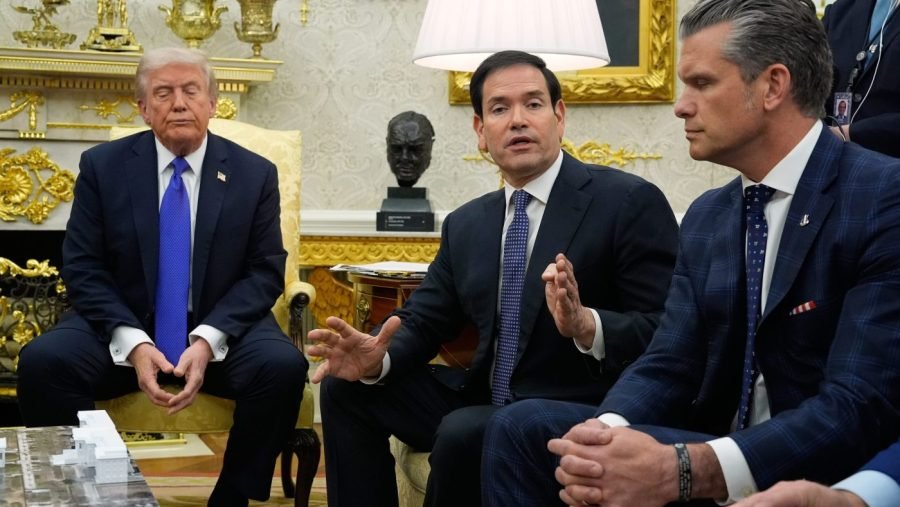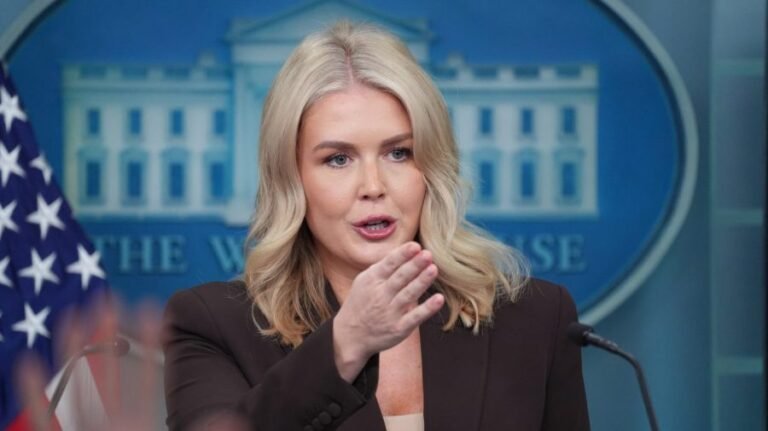
President Trump met with NATO Secretary-General Mark Rutte at the White House on Wednesday, shortly after Treasury Secretary Scott Bessent announced new sanctions on Russia’s biggest oil exporters.
The move marked the Trump administration’s most significant action yet in its efforts to pressure Russian President Vladimir Putin to negotiate an end to his war in Ukraine.
Trump also explained why he called off a planned meeting with Putin and decided against supplying Tomahawk missiles to Ukraine, while also touching on his military campaign against South American drug cartels and his potential meeting with Chinese leader Xi Jinping during an upcoming trip to Asia.
Here are the key takeaways from the meeting.
‘It was time’ for Russia sanctions
The Treasury Department announced Wednesday afternoon it was hitting Russia’s two largest oil companies, Open Joint Stock Company Rosneft Oil Co. and Lukoil OAO, with sanctions.
“I just felt it was time. We waited a long time,” Trump told reporters in the Oval Office, when asked about the move.
“It’s a very big day in terms of what we’re doing,” he added. “These are tremendous sanctions. They’re big, these are against their two big oil companies and we hope they won’t be on for long. We hope that the war will be settled. We just answered having to do with various forms of missiles and everything else that we’re looking at, but we don’t think that’s going to be necessary.”
Trump has long threatened sanctions against Russia if Putin refuses to move toward a peace deal. Republicans in the Senate have been anxious to move their own Russia sanctions package, but Trump has yet to give the green light for a floor vote.
Trump said he would like to see Russia agree to end the war along the current front lines and “just go home.”
Putin meeting ‘didn’t feel right’
The sanctions announcement came after the Trump administration reversed course on a second Trump-Putin summit to be held in Budapest, Hungary.
The U-turn came after what was meant to be a preparatory call between Secretary of State Marco Rubio and his Russian counterpart, Sergey Lavrov.
The White House released a statement Tuesday saying there were no immediate plans for the meeting, which Trump had previously said would happen within two weeks.
“We canceled the meeting with President Putin,” Trump said alongside Rutte. “It just didn’t feel right to me. It didn’t feel like we were going to get to the place we have to get. So I canceled it, but we’ll do it in the future,” he said.
Hungarian Foreign Minister Péter Szijjártó said the meeting was just a matter of time, following a conversation with Rubio on Wednesday.
“After my meeting with @SecRubio, it’s clear that the US has not given up on holding the Budapest Peace Summit. Preparations are ongoing and the only question is timing, not intention,” he wrote on social platform X.
‘Tremendous learning curve’ with Tomahawks
Trump elaborated on his decision not to provide long-range Tomahawk cruise missiles to Ukraine, arguing it takes about a year to learn how to fire the powerful munition and that the U.S. will not be teaching others how to use them.
“The problem with the Tomahawk that — a lot of people don’t know — it’ll take a minimum of six months, usually a year, to learn how to use them. They’re highly complex, so the only way a Tomahawk is going to be shot is if we shot it, and we’re not going to do that,” the president said.
“But there is a tremendous learning curve with the Tomahawk. It’s a very powerful weapon, very accurate weapon, and maybe that’s what makes it so complex. But it will take a year,” the president added. “It takes a year of intense training to learn how to use it, and we know how to use it, and we’re not going to be teaching other people. It will be too far out into the future.”
Ukrainian President Volodymyr Zelensky said his meeting with Trump in Washington on Friday was “positive,” even without securing a commitment from the president to send over the Tomahawk missiles, which would allow Kyiv to strike deep inside Russia, targeting military outposts and energy facilities.
Zelensky said Tuesday that Trump’s decision not to send Tomahawks to Ukraine deflated Russia’s interest in engaging in diplomacy that could lead to end of the war in eastern Europe.
May go to Congress for cartel strikes on land
Trump said the administration may go to Congress for authorization to strike drug cartels that are smuggling narcotics on land.
“We will hit them very hard when they come in by land. And they haven’t experienced that yet, but now we’re totally prepared to do that. We’ll probably go back to Congress and explain exactly what we’re doing when we [they] come to the land,” the president said Wednesday.
The administration has waged a military campaign against alleged drug-smuggling boats in the Caribbean, killing at least 32 people.
Earlier on Wednesday, Defense Secretary Pete Hegseth revealed that the U.S. military struck an alleged drug vessel in the East Pacific, the first strike on that side of the continent, killing two “narco-terrorists.”
Trump has raised the possibility of striking drug cartels on land as part of the administration’s push to curb the influx of narcotics into the U.S.
The maritime strikes have prompted pushback from Democrats and at least one Republican, Sen. Rand Paul (R-Ky.), who argued the deadly attacks are illegal.
Trump contended Wednesday that his administration has legal authority to blow up the alleged drug boats.
“We have legal authority. We’re allowed to do that, and if we do by land, we may go back to Congress, but we have, this is a national security problem,” the president said.
Expects deal on ‘everything’ out of Xi meeting
It’s not entirely clear when, where or even if Trump will meet China’s leader during his upcoming trip to Asia. But Trump said Wednesday he expected the meeting to happen and predicted the leaders would strike a sprawling deal.
“We’ll make a deal on, I think, everything,” Trump told reporters.
“I think we’re going to make a deal on soy beans and the farmers. I think we’re going to make a deal on maybe even nuclear [weapons],” he said.
Trump said China’s move to impose export controls on rare earth minerals was “the least of it,” adding “tariffs are much more powerful than the rare earth.”
China controls a large majority of the world’s market for minerals that are crucial to everything from computer chips to weapons production.
Trump responded to China’s announcement of new export controls with retaliatory 100 percent tariffs set to kick in by Nov. 1. The administration is also reportedly considering curbs on software-powered exports to China.
Trump is scheduled to head to Asia at the end of this week, with stops planned in Malaysia, Japan and South Korea.


